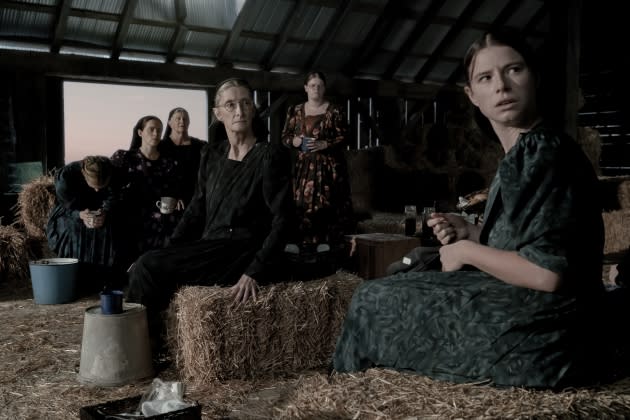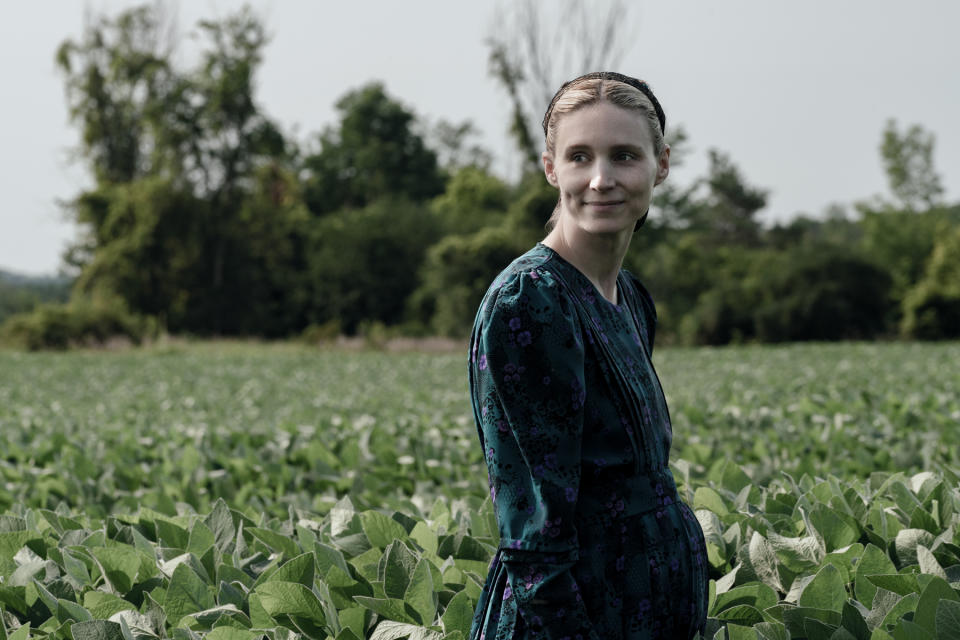‘Women Talking’ Shatters the Silence Around Sexual Abuse
- Oops!Something went wrong.Please try again later.
- Oops!Something went wrong.Please try again later.
- Oops!Something went wrong.Please try again later.

Some want to stand their ground and fight — after all, this is their home, too. Many want to leave and start anew. There’s an option to vote for doing nothing, but really, the days of simply enduring and ignoring are long gone. The choices that a group of women face in Sarah Polley’s Women Talking, her adaptation of Miriam Toews’ book, basically boil down to: Should they stay or should they go?
What has brought the various female members of a Mennonite community to this point is an epidemic. Maybe plague is a better description, given the extraordinary amount of damage that’s been done. The women have, over several years, been systematically drugged and then raped in their sleep. They have been told that it might be the work of ghosts, or perhaps Satan. Or maybe they’re just making all of this up for attention, the elders tell them — that it’s all just “an act of wild female imagination.” The bruises, the blood, the infections and the “mystical” pregnancies suggest otherwise. As does the fact that two of the community’s younger members, Autje (Kate Hallett) and Neitje (Liv McNeil), have recently caught one of their brethren fleeing the scene of the crime.
More from Rolling Stone
'We Can Imagine a Better Future': Sarah Polley on 'Women Talking'
Do Nothing, Fight, Leave: Women Take Fate Into Their Own Hands in 'Women Talking' Trailer
Numerous arrests are made. The remaining men go into town to raise bail money for the offenders, but not before informing the women that they have two days to “forgive” and forget. Failure to do so means they won’t gain entry into the kingdom of heaven. They will also be cast out of the community.
It’s here that Polley starts her inquiry into how assault is talked about, or not talked about, and the dilemma this sorority of survivors faces. She introduces her ensemble in quick, sketch-like fashion, giving you a sense of their sensibilities before letting them verbally duke it out. Salome (Claire Foy) is rage and righteousness personified. Ona (Rooney Mara), who’s pregnant from one of these attacks, exhibits hope, charity and Zen-like calm. Mejal (Michelle McLeod) is somehow reticent and rebellious — she smokes! — at the same time. Autje and Neitje are girlish, yet observant. Two older women, Greta (Sheila McCarthy) and Agata (Judith Ivey), are the voices of reason and experience. Mariche (Jessie Buckley) is contemptuous of all this handwringing; she’s suffered in silence, why can’t everyone else? The lone male on-hand is August (Ben Whishaw), a schoolteacher. He’s also clearly in love with Ona and, reluctantly, a necessary presence as none of these women can read or write. They’ve never been allowed.

They can finally speak up about what’s happened to them, however, and have a say in what the future might hold for themselves, their sisters, their daughters. Women Talking is set up to be a debate rather than a dialectic: no one among the assembled is saying these assaults didn’t happen, just arguing over what the response should be. It’s to the film’s credit that it never fully devolves into the equivalent of a stage play captured on film. Which, look, when you’re working with a cast like this….
You can imagine the writer-director’s temptation to simply turn the cameras on, let these actors dig into the material, and get out of the way. There’s not a false note among the line readings, even when things threaten to creep toward the didactic, or when the narrative occasionally stumbles or sags. Performers take turns filling the MVP slot — even the cameos contribute; blink and you may miss Frances McDormand as a stern matriarch — and know how to adjust what they’re doing to complement their fellow screen partners. (Buckley seems to instinctively know when to turn up her disdain and make her smirk that much more scornful, all the better to let Mara’s modest sunniness shine brighter or shorten Foy’s already-sizzling fuse. Meanwhile, McCarthy can flip her character from harmless crone to caring to corrosive on a dime, depending on what the needed contrast is.) This is screen democracy in action.
But Polley is also a capital-F Filmmaker, and having been away for a bit, she appears to have a lot of creative energy she’s itching to get out. Her last movie, the investigative auto-documentary Stories We Tell, came out in 2012, though she hasn’t been idle: Polley spent the past 10 years recovering from an injury, writing a book of essays, penning the scripts for limited TV series Alias Grace, raising a family, living a life. That The Sweet Hereafter star is an excellent director of actors is not surprising, especially given how nuanced and understated her own onscreen work has been. You may have forgotten that she has an incredibly keen visual sense, and a gift for telling stories in occasionally impressionistic ways without sacrificing frankness or honesty. (See: the montage that ends her bittersweet romance Take This Waltz.)
The main location remains a single barn interior, where these women confess and cajole and console, laugh and cry and, naturally, talk. And while Polley refuses to open that space up at the cost of making things more distracting or detrimental in regards to what these women are talking about, she has no qualms about adding quick visual asides, snippets of nightmarish flashbacks and Malick-esque romps through fields in the name of texture. You might be surprised to suddenly hear “Daydream Believer” play on the soundtrack. Some of these are lyrical respites that flow in and out of the conversations, while others come at you out of nowhere — they pop up like buried trauma memories suddenly being unearthed in your brain. Many of the mercifully short morning-after sequences are just elliptical enough to not wallow in forensics, yet specific enough to suggest something extremely horrible and violating has occurred. There’s a sensitivity in even the most grand-gesture flourishes Polley and her editors Christopher Donaldson and Roslyn Kalloo throw in, but you also know there’s a voice behind this camera. And it belongs to an artist who definitely has something to say.
Women Talking, a story set in a specific subculture (the source material was loosely based on a real-life spate of sexual assaults on Mennonite women in Bolivia), isn’t really about that subculture at all. It would be convenient to chalk up what happened to these characters, the choices they have to make, the discussions they’re having and the fact that neighbors, fathers, brothers and friends have become their tormentors, as a phenomena that occurs solely within an insular world. It does not. It is rampant, embedded, systematic. It is part of our collective culture.
And while a reckoning of sorts has begun over the last few years, any attempt to get at the root of it all feels far away. Polley, her collaborators and her cast don’t pretend to have the answers any more than the book did or most of us do. They do know, however, that change has to come. That may come in the form of fighting back, or it may come in the form of a rip-it-up-and-start-again utopian ideal. What the film does know, however, is that it begins with the talking part.
Best of Rolling Stone

